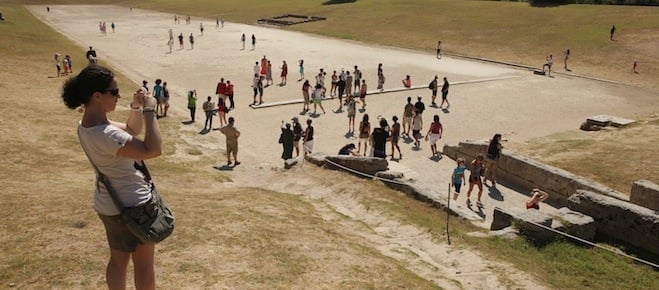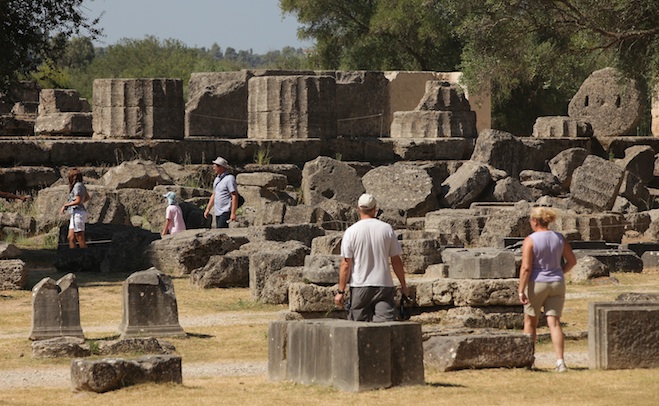7 things that we might not miss from the ancient Olympics
The Games sure have changed in the last 2,700 years
< > on July 26, 2012 in Olympia, Greece.
Share

The first Olympic games held back in 753 BCE in Olympia, Greece lasted a single day and featured one event: a short sprint. But over the next 1,147 years–making those games the longest-running recurring event in antiquity–they grew to five days long and more events were added. Think wrestling, boxing, long jump and throwing of the javelin and discus.
Today, some things remain the same: for example, the summer and winter games respectively are held every four years (the ancient Games didn’t make the seasonal distinction, though) and athletes are still strictly forbidden, as far as I know, to cast spells against their opponents. But for the most part, the modern Games have evolved into a different event all together. Here are eight of the biggest differences.
- No more naked athletes: all the competitors in the original Greek Games wore nothing, save a for thin coating of olive oil
- No more swearing on a bloody slice of boar flesh in front of the statue of Zeus at the opening ceremony. But that statue, one of the seven wonders of the ancient world, made of gold and ivory and about six times life-size must have been pretty impressive.
- No more sacrifices: on the first day of the games, 100 oxen would be sacrificed to Zeus. That’s a lot of mess. But on Day 5, they cooked it all up for a big feast.
- No more Pankration–a sort of no holds barred wrestling match, where even strangulation was permitted.
- As in modern times, there were prostitutes working the Greek Games in antiquity. But unlike Vancouver 2010, their business actually increased: Apparently, ancient working girls could make as much as money in five days during the Olympics as they would in the rest of the year.
- No more banning women from competing and spectating: Only men and boys were allowed to compete and only unmarried women were permitted to watch. However, there was a separate event held every four years at Olympia for unmarried female athletes called the Heraia, held in honour of Zeus’s wife Hera.
- No more olive wreaths are awarded to the winners. But, similar to modern day medal winners, a victory ensured invitations to great parties, the best seat in the house at concerts, dinners comped, marriage proposals, vats of olive oil, statues made and odes sung in their honour and, of course, fame.
Read this fantastic Q&A with historian Tony Perrotet, author of The Naked Olympics: The True Story of the Ancient Games, from the National Geographic, for further reading on the Olympics in antiquity.

 Have you ever wondered which cities have the most bars, smokers, absentee workers and people searching for love? What about how Canada compares to the world in terms of the size of its military, the size of our houses and the number of cars we own? The nswers to all those questions, and many more, can be found in the first ever Maclean’s Book of Lists.
Have you ever wondered which cities have the most bars, smokers, absentee workers and people searching for love? What about how Canada compares to the world in terms of the size of its military, the size of our houses and the number of cars we own? The nswers to all those questions, and many more, can be found in the first ever Maclean’s Book of Lists.
Buy your copy of the Maclean’s Book of Lists at the newsstand or order online now.